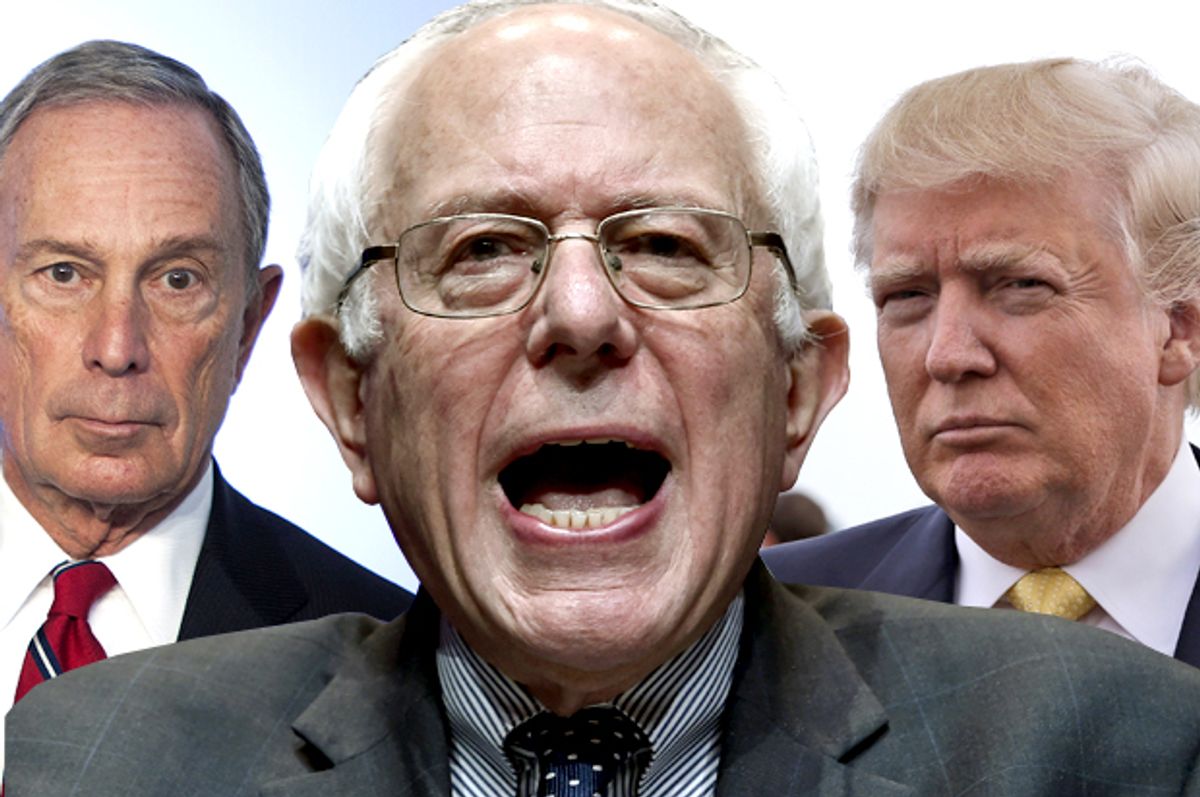The billionaire former mayor of New York City, Michael Bloomberg, is considering a presidential run in 2016. According to the New York Times, the business magnate already has his advisers laying out plans for an independent campaign. Alexander Burns and Maggie Haberman write: Bloomberg is “galled by Donald Trump's dominance of the Republican field, and troubled by Hillary Clinton's stumbles and the rise of Senator Bernie Sanders of Vermont on the Democratic side.”
The political class seems to think a race between Trump or Cruz on one side and Sanders on the other would be uniquely hospitable to an indepenent like Bloomberg. And indeed some establishment Democrats would likely support Bloomberg over Sanders, if it came to that. Ed Rendell, the former governor of Pennsylvania and DNC chairman (also a longtime Clinton ally), summed up what I imagine is a common sentiment among party insiders: “Mike Bloomberg for president rests on the not-impossible but somewhat unlikely circumstance of either Donald Trump or Ted Cruz versus Bernie Sanders. If Hillary wins the nomination, Hillary is mainstream enough that Mike would have no chance, and Mike's not going to go on a suicide mission.” Revealingly, Rendell added that he would be open to backing Bloomberg in such a circumstance: “As a lifelong Democrat, as a former party chairman, it would be very hard for me to do that. But I would certainly take a look at it – absolutely.”
This attitude on the left is part of the problem, and proves the Democratic establishment has yet to understand what Bernie Sanders is doing. Bernie's campaign is trying to redefine what constitutes the “mainstream.” If Clinton or Bloomberg or Rubio or Bush is “mainstream” today, it's because of a lack of voter participation, because the majority of the country doesn't vote. Sanders understands this, and his campaign aims to energize a restless majority, whose interests aren't reflected in the Washington consensus.
In an interview on “Meet the Press” yesterday, Sanders was asked about the prospect of a Bloomberg run as well as the prevailing view – in both Republican and Democratic circles – that he can't win a general election. His response was instructive:
“That is looking at politics today as a zero-sum approach. And what I am trying to do in this country is to say, 'You know what, in the last election, 63 percent of the American people didn't vote. 80 percent of young people didn't vote in the midterm election {emphasis mine]. That is why the rich get richer. And that is why billionaires are able to buy elections. What we are trying to say is that in an American democracy, maybe it's a radical idea, but Congress should represent the working families and the middle class rather than just wealthy campaign contributors. So Chuck, what I am trying to do now is change the dynamics of American politics. Bring millions of young people, working-class people, in to stand up and fight for their rights...M reaction is that if Donald Trump and Mr. Bloomberg gets in, you're going to have two multi-billionaires running for president of the United States against me. And I think the American people do not want to see our nation move toward an oligarchy where billionaires control the political process. I think we'll win that election.”
Sanders's campaign is all about turnout. He's not so much persuading the mythical moderates or the mercurial swing voters (though in some respects he is); rather, he's trying to bring new voters to the polls, voters who have either grown indifferent to or were never a part of the process. If Sanders is leading a “revolution” at all, this is what it means.
Sanders is right to welcome a race with Trump and Bloomberg, because it makes the central point of his campaign for him, which is that politics is a game of and for the rich, with the middle class as a kind of rhetorical prop for candidates on both sides. It's true that Sanders has an uphill climb in front of him, and he could very well lose to Clinton or Bloomberg or someone like Rubio (although the current numbers suggest otherwise).
To Sanders credit, he doesn't deny any of these possibilities. What makes his campaign unique is that it's precisely the opposite of what so many critics charge: pragmatic. Unlike, say, President Obama, who promised to transform politics overnight, Sanders knows that's not how democracy works. Hope and change is a nice slogan, but it doesn't happen after a single election. Hence Sanders has stressed the necessity of greater involvement and participation beyond his campaign – that's how social change happens, and it's the only way it happens.
Sanders has absorbed the lesson of the Obama years. What Obama has accomplished in the face of an historically obstructionist Congress is remarkable, but it's obvious that only sustained participation over the course of several elections will make a real dint in our politics. Sanders has shown he can get people involved, shattering records for individual donations in a presidential. The real test will be whether these people show up to vote.
If they do, Sanders can beat anyone, including Michael Bloomberg.

Shares